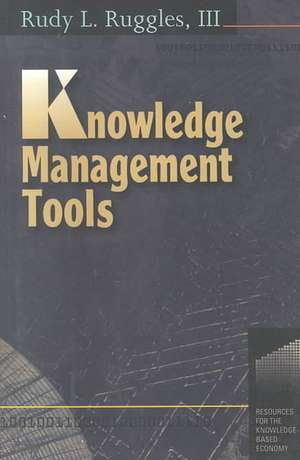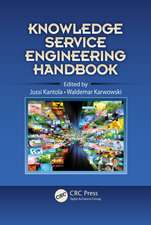Knowledge Management Tools
Autor Rudy Rugglesen Limba Engleză Paperback – 11 dec 1996
The selections in this volume were carefully chosen to represent the strengths and weaknesses, and pros and cons of using technology to support knowledge-based activities. They acknowledge that, although tools alone are not the answer to the difficult questions surrounding knowledge management, if utilized effectively tools can open up new realms of innovation and efficiency for today's knowledge-driven businesses.
Preț: 224.51 lei
Preț vechi: 365.51 lei
-39% Nou
Puncte Express: 337
Preț estimativ în valută:
42.97€ • 46.69$ • 36.12£
42.97€ • 46.69$ • 36.12£
Carte tipărită la comandă
Livrare economică 14-28 aprilie
Preluare comenzi: 021 569.72.76
Specificații
ISBN-13: 9780750698498
ISBN-10: 0750698497
Pagini: 314
Dimensiuni: 156 x 234 x 16 mm
Greutate: 0.58 kg
Ediția:1
Editura: Taylor & Francis
Colecția Routledge
Locul publicării:Oxford, United Kingdom
ISBN-10: 0750698497
Pagini: 314
Dimensiuni: 156 x 234 x 16 mm
Greutate: 0.58 kg
Ediția:1
Editura: Taylor & Francis
Colecția Routledge
Locul publicării:Oxford, United Kingdom
Public țintă
Professional Practice & DevelopmentCuprins
Chapter 1 Tools for Knowledge Management: An Introduction, Rudy L. Ruggles III; Part 1 Knowledge and Technology; Chapter 2 Information Processing in Computer and Man (1964), Simon Herbert; Chapter 3 Why Computers May Never Think Like People, Stuart Hubert, Dreyfus; Chapter 4 How Many Bulldozers for an Ant Colony?, Daniel Crevier; Part 2 Knowledge Generation; Chapter 5 Information Systems and the Stimulation of Creativity, David Bawden; Chapter 6 The Light of Discovery, George Johnson; Part 3 Knowledge Codification; Chapter 7 Information Retrieval and Cognitive Authority, Patrick Wilson; Chapter 8 Humans, Machines, and the Structure of Knowledge, Harry M. Collins; Part 4 Knowledge Transfer; Chapter 9 Collaborative Tools: A First Look, Michael Schrage; Chapter 10 Knowledge Synthesis and Computer-Based Communication Systems: Changing Behaviors and Concepts, Kathleen Vian, Robert Johansen; Part 5 Implementation; Chapter 11 Implementing and Integrating New Technical Processes and Tools, Dorothy Leonard-Barton; Chapter 12 Learning from Notes: Organizational Issues in Groupware Implementation, Wanda J. Orlikowski; Chapter 13 Cosmos Vs. Chaos: Sense and Nonsense in Electronic Contexts, Karl E. Weick; Chapter 14 Future: A Knowledge-Based System for Threat Assessment, P.J. dejongh, K.J. Carden, N.A. Rogers; Part 6 What Next?; Chapter 15 Webs of Cognition, Daniel McNeill, Paul Freiberger; Chapter 16 Into the Future, Stan Franklin;
Descriere
The third in the readers series Resources for the Knowledge-Based Economy, Knowledge Management Tools analyzes the use of knowledge management tools in the past, present and future. It helps managers and companies utilize what they know.
The selections in this volume were carefully chosen to represent the strengths and weaknesses, and pros and cons of using technology to support knowledge-based activities. They acknowledge that, although tools alone are not the answer to the difficult questions surrounding knowledge management, if utilized effectively tools can open up new realms of innovation and efficiency for today's knowledge-driven businesses.
The selections in this volume were carefully chosen to represent the strengths and weaknesses, and pros and cons of using technology to support knowledge-based activities. They acknowledge that, although tools alone are not the answer to the difficult questions surrounding knowledge management, if utilized effectively tools can open up new realms of innovation and efficiency for today's knowledge-driven businesses.











